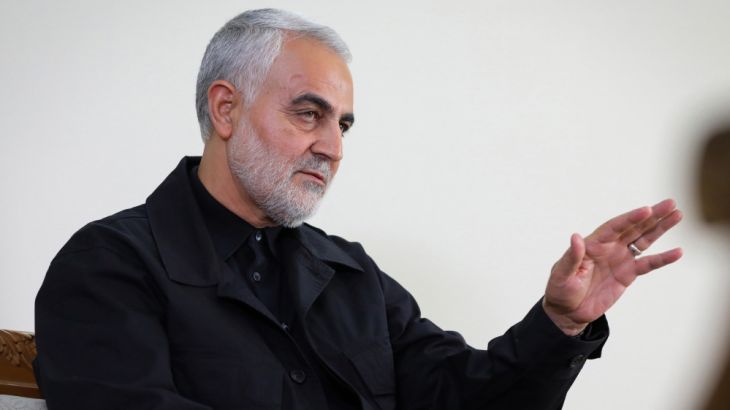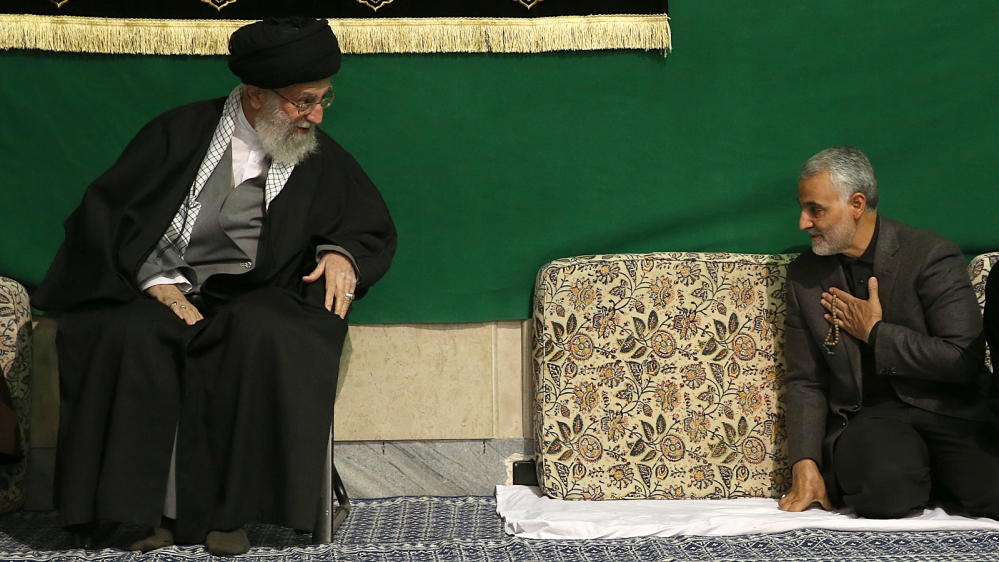Who was Qassem Soleimani, Iran’s IRGC’s Quds Force leader?
General Qassem Soleimani was killed alongside six others following a US air raid at Baghdad’s international airport.

General Qassem Soleimani, the head of Iran’s Islamic Revolutionary Guard Corps’ (IRGC’s) Quds Force has been killed early on Friday alongside several others following a US air raid at Baghdad’s international airport.
Soleimani acquired celebrity status at home and abroad as leader of the Quds Force, the foreign arm of the IRGC, and for his key role in fighting in Syria and Iraq and spreading Iranian influence in the Middle East, which the United States and Tehran’s regional foes Saudi Arabia and Israel have struggled to keep in check.
Keep reading
list of 3 itemsIran rejects US accusation of being behind Baghdad protests
Protesters at US embassy in Baghdad gear up for sit-in
He survived several assassination attempts against him by Western, Israeli and Arab agencies over the past 20 years.
Soleimani’s Quds Force, tasked with carrying out operations beyond Iran’s borders, shored up support for Syrian President Bashar al-Assad when he looked close to defeat in the civil war raging since 2011, and also helped armed groups defeat the ISIL (ISIS) group.
Ascent to power
Soleimani became head of the Quds Force in 1998 and kept a low profile for years while he strengthened Iran’s ties with Hezbollah in Lebanon, Syria’s al-Assad and Shia militia groups in Iraq.
He stepped into the limelight in recent years, appearing alongside Iran’s Supreme Leader Ayatollah Ali Khamenei and other Shia leaders.

Under Soleimani’s leadership, the Quds Force vastly expanded its capabilities, becoming a significant influence in intelligence, financial, and political spheres beyond Iran’s borders.
Soleimani was born into a poor family in southeastern Iran’s Kerman Province.
He started working as a 13-year-old to help support his family, spending his free time lifting weights and attending sermons by the founder of the Islamic Republic Ayatollah Khomeini.
As a young man during the Iranian revolution in 1979, Soleimani began his ascent through the Iranian military, reportedly receiving just six weeks of tactical training before seeing combat for the first time in Iran’s West Azerbaijan province, according to Foreign Policy magazine.
Soleimani emerged from the Iran-Iraq war a national hero for the missions he led across Iraq’s border.
Arms in Iraq and Syria
Following the re-establishment of government in Iraq in 2005, Soleimani’s influence extended into Iraqi politics under the leadership of former Prime Ministers Ibrahim al-Jaafari and Nouri al-Maliki.
During that time, the Badr Organisation, a Shia political party and paramilitary force that has been described as “Iran’s oldest proxy in Iraq”, became an arm of the state after the interior and transport ministries came under the control of the armed group’s political wing.
Following the outbreak of civil war in Syria in 2011, Soleimani ordered some of his Iraqi militias into Syria to defend the Assad government.
During Iraq’s fight against ISIL, the Hashd al-Shaabi (Popular Mobilisation Forces) – Iran-backed Shia paramilitary units, some of which fell under Soleimani’s control – fought alongside the Iraqi military to defeat the armed group.
Mohammad Marandi, head of American Studies at the University of Tehran, said Soleimani’s role in helping defeat ISIL made him a “national hero” and a “martyr” among the Iranian people and other Middle Eastern countries.
“If it wasn’t for people like him, this region would have seen black flags flying across the region.”
Threats to Soleimani
Soleimani was rumoured to be dead on several occasions, including in a 2006 aircraft crash that killed other military officials in northwestern Iran and following a 2012 bombing in Damascus that killed top aides of embattled Syrian President al-Assad.
In November 2015, rumours circulated that Soleimani had been killed or seriously wounded leading forces loyal to al-Assad as they fought around Syria’s Aleppo.
More recently in October, Tehran said it had foiled a plot by Israeli and Arab agencies to kill Soleimani.
Israeli Foreign Minister Israel Katz said in August that his country was working to “uproot” Soleimani, according to Israeli media.
|
|